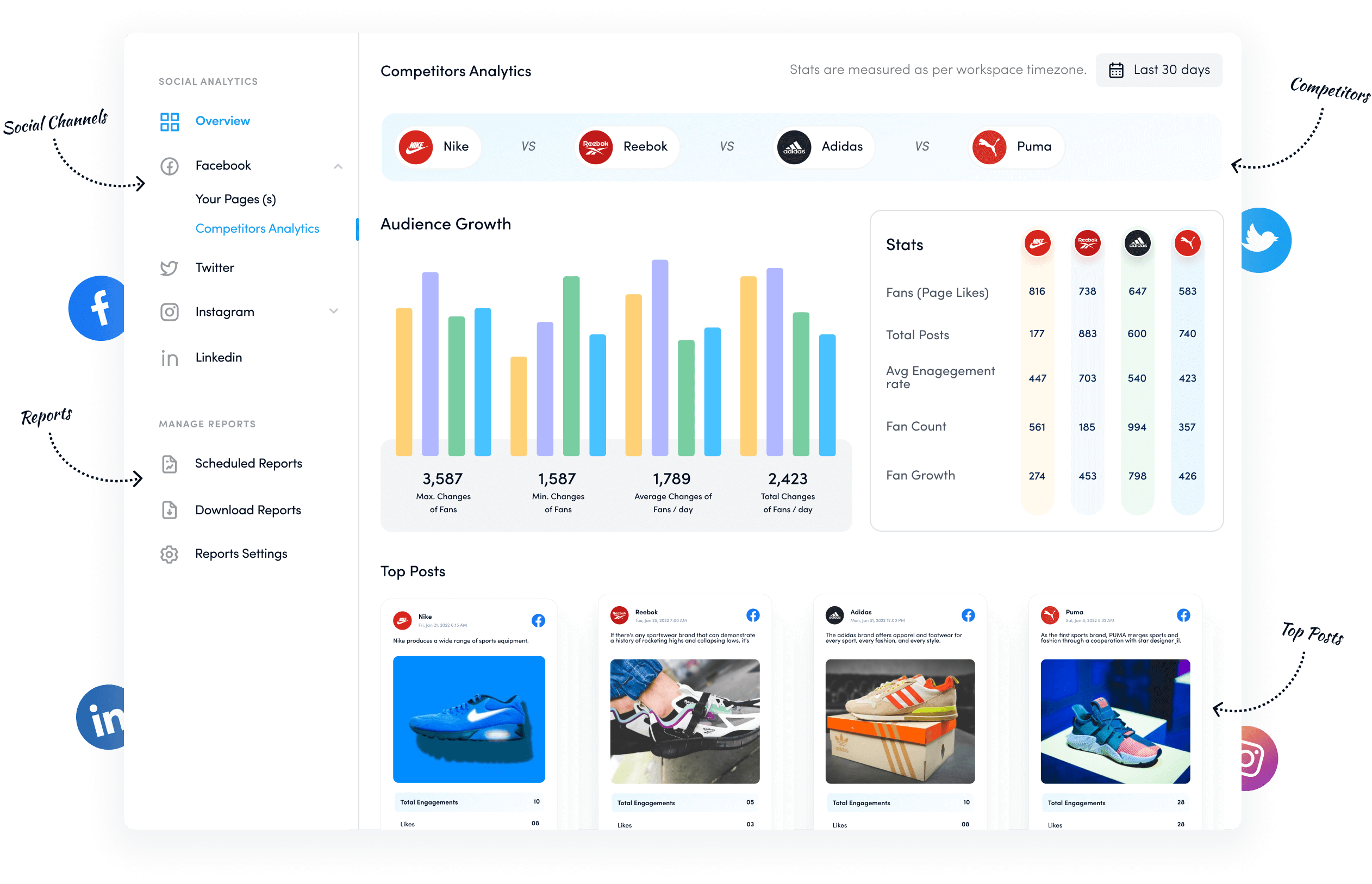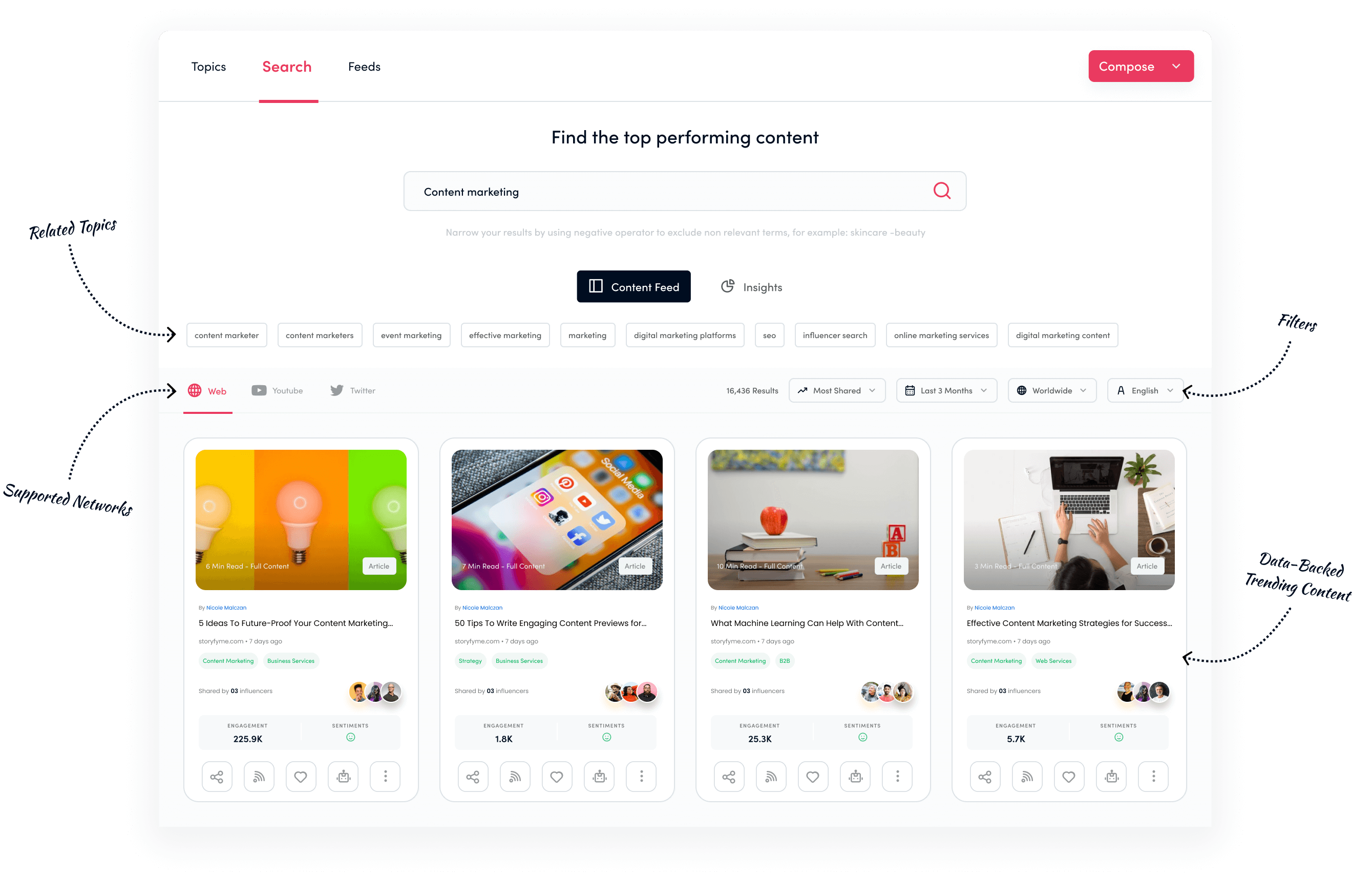Bulk-generate & schedule posts in seconds with Smart Scheduling. Try now!
A comprehensive guide to social media rebranding

Are you not getting the leads you expect from social media platforms? Or maybe your perfectly curated social media feed looks outdated and not reflective of your brand anymore. Social media rebrand is the answer to all your such woes
Social media’s dynamic and constantly evolving nature requires periodic rebranding to ensure that your content resonates with your target audience.
Moreover, with 77% of small businesses using social media to connect with customers, the entire landscape has become quite competitive. Brands must get creative to capture users’ attention and stop them from scrolling and skipping their social media accounts.
In this detailed blog post, you’ll learn about social media rebranding to breathe new life into your online presence.
Experience organized workflow with a unified social media management platform for agencies.
Try ContentStudio for FREE
What is a social media rebrand?
Understanding the concept of a social media rebrand becomes easy if you think of your social media presence as a physical store where you are showcasing your products or services. Just like a physical store needs renovation occasionally, your social media also needs rebranding to stay fresh and relevant.
In other words, a social media rebrand is a strategic refresh of your online presence across various social media sites. It is important to remember that rebranding is much more than just slapping on a new logo, even if it is an important part.
Instead, rebranding consists of numerous steps and strategies that involve taking a step back and re-evaluating how you want your brand to be perceived on social media.
P.S. Do you know how social media emojis enhance your online presence?
Why rebrand yourself on social media?
So, now you know that a comprehensive social media rebrand can give your social media presence a much-needed facelift.
By investing your time and energy in implementing effective rebranding strategies, you can enjoy the following benefits:
- Get new followers
Keeping up-to-date with the latest social media trends is the key to growing your presence. Otherwise, there is a high chance that a new or rebranded account can outsmart you and win over your audience.
So, you should ask yourself, ‘Is your current social media giving out vibes of yesteryears?’ If yes, a social media rebrand can help you shed that outdated skin and attract a fresh wave of followers who resonate with your brand’s new direction.
Related Read: How to get more Instagram followers in 2024
- Stay relevant
Since social media is always evolving, it is understandable that you have to adapt to new trends from time to time to stay relevant and competitive. Constant evolution also means that what resonated with your audience a few years ago may no longer be effective.
Therefore, social media rebranding is an excellent opportunity for brands to stay current with industry trends and consumer preferences and remain competitive in the market.
- Ensure brand consistency
Showcasing a consistent and up-to-date brand identity across social media platforms can help you enhance brand recognition and reach. It is possible that you might not ensured consistency in your initial branding efforts, but rebranding is a great time to create a clear and consistent brand image.
Ultimately, consistent visuals, messaging, and tone help create a solid, memorable brand that stands out in a crowded digital space.
Example
Following is an example of how OpenAI, an AI research organization mainly known for ChatGPT, maintains consistency across the different social media platforms:
- YouTube
- Get rid of negative perceptions
While social media offers many benefits to a brand, it also comes with trolls, severe criticism, and often negative perceptions that can make or break an online brand.
So, if your brand has also faced negative feedback or has become known for its outdated practices, you should consider a comprehensive rebrand to reset perceptions and improve your brand’s reputation.
Kodak is one famous example of a company that failed due to negative perceptions and a lack of innovation. It was once one of the most reputable names in the photography industry, but the company failed to update its technology in the digital era, leading to its bankruptcy. The company has now rebranded itself as an imaging technology company.
- Show your growth
Your brand (and hopefully you!) is constantly evolving.
As your business evolves, your goals and values might change. Rebranding allows you to realign your social media presence with these new objectives, ensuring your online identity supports your broader mission and vision.
Moreover, a rebrand can help your social media presence reflect your company’s growth and showcase exciting new developments or offerings.
For example, Meta’s rebranding in 2021 as the parent company of Facebook, Instagram, WhatsApp, and other apps is a testament to the company’s commitment to developing the metaverse.
Key components of social media rebranding
Now that you’re familiar with the potential of rebranding yourself on social media let’s delve into the nitty-gritty!
Here are the key components you’ll want to consider to ensure your social media transformation is a resounding success:
- Set goals & objectives: Before diving headfirst into design changes and content creation, take a moment to define your social media goals. What do you hope to achieve with your social media rebrand?
- Analyze your audience: Who are you trying to reach with your social media presence? Understand your target audience’s demographics, interests, and online behavior.
Social Media Analytics
Fine-tune your social media strategy for success with in-depth analytics and white-labeled reports.
Get Started for FREE
- Craft an attractive visual identity: They say a picture is worth a thousand words, and that certainly holds true on social media. Your visual brand identity, including your profile picture, cover photo, and templates, should be visually appealing and consistent across all platforms. Following is an example of how Mailchimp’s visual identity has changed over the years:
- Brand voice: How do you want to sound on social media? Develop a voice that aligns with your overall brand personality and resonates with your target audience.
Let’s take the example of two popular language-learning apps: Duolingo and Memrise. Dualingo’s brand voice is highly humorous and often informal, as seen in the following Instagram posts.
On the other hand, Memrise also has a friendly brand voice, but its overall style is more formal and direct, as seen in these posts:
Related Read: How to build brand voice with social media automation
- Focus on content: High-quality content is the heart of any successful social media strategy. Revamp your content calendar to reflect your brand’s current direction and target audience.
7 steps to successfully rebrand your social media
Rebranding your social media presence is a significant undertaking that requires careful planning and execution. It’s not just about changing your logo or color scheme; it’s about transforming how your audience perceives your brand.
A successful rebrand can rejuvenate your online presence, attract new followers, and reinforce your brand’s identity.
Here are seven essential steps to guide you through rebranding your social media:
Step # 1 -Audit your existing social media profiles
Before starting a full-fledged social media rebrand, it’s crucial to understand your current standing.
Consider auditing social media profiles as examining your closet before a shopping spree. A social media audit involves examining your existing profiles across all platforms.
Here’s what you’ll want to explore and analyze:
- Evaluate current branding elements: Review your profile pictures, cover photos, logos, bios, and other visual elements across all platforms.
- Analyze content performance: Examine the types of content you’ve been posting, including text, images, videos, and links. Identify which posts have received the most engagement and which have underperformed. You can thoroughly analyze your social media with ContentStudio to get all critical metrics about your social media.
- Identify gaps and opportunities: Highlight areas where your branding falls short or is outdated. Look for opportunities to improve and align your social media presence with rebranding goals.
- Monitor Competitors: Analyze your competitors’ social media profiles to see how they are positioning themselves. Identify their strengths and weaknesses, and look for gaps you can exploit to differentiate your brand.
By the end of a thorough social media audit, you’ll have valuable insights that will be the foundation for rebranding efforts.
A roadmap showing where you’ve been helps you chart the course for a more prosperous future.
Step # 2 – Set clear goals and objectives
Once you have a clear understanding of your current social media landscape (thanks to the audit!), it’s time to set your sights on the future.
This step involves crafting a compelling brand story and defining the goals you want to achieve with your rebrand.
Set specific goals
Now, let’s get specific.
What do you hope to accomplish with your social media rebrand? Do you want to attract a younger demographic, increase brand awareness, or boost engagement with your existing followers?
Clear, measurable goals will keep you focused and ensure your rebranding efforts are moving you in the right direction.
Define a brand story
Every successful brand has an effective story to tell to connect with its audience. A relatable brand story can even help it go viral and become an overnight success.
Statistics also support the significance of storytelling in branding and marketing.
For example, one study shows that if people love a brand story, 55% are likely to buy the product in the future, 15% will buy it immediately, and 44% will share the story.
Remember that a brand story is the soul of your social media presence. It should not sound like some fluffy marketing material. Instead, it should reflect the essence of who you are and why people should care.
Therefore, you should take some time to refine the narrative and story that will form the foundation of your social media messaging, guiding the content you create and the voice you use.
Example
Nike has always been a famous brand, even without social media. However, it was one of the first major brands that capitalized on the power of social media marketing, especially storytelling, to catapult to new heights of success.
Nike’s Equality Campaign in 2017 repositioned Nike as a company that not only sells shoes but also contributes to bringing change in society. It created a powerful brand story that by wearing a pair of Nike, you can also support the movement for equality rights.
Another Nike ad with an American football quarterback and civil rights activist sent the company’s stocks to record highs as it solidified its identity, voice, and overall what it stands for.
Nike releases full ad featuring Colin Kaepernick:
Step # 3 – Create a comprehensive rebranding strategy
The time has come to translate your brand story and goals into a concrete social media rebranding strategy.
A clear roadmap will guide your rebranding journey to get the desired results. Some of the critical aspects you should consider in this step are:
Deliverables
Create a list of all the deliverables you are expecting to have throughout the rebranding process, such as:
- Style guide: This document will be your social media bible, outlining your brand voice, visual identity (including color palettes, fonts, and logo usage), and content formats. The goal of a style guide is to ensure consistency across all platforms.
- Content calendar: Plan your content strategy for the coming weeks or months. This calendar should include each platform’s post ideas, themes, and publishing schedules. You can even schedule your posts in advance with ContentStudio.
- Launch announcement assets: Create eye-catching visuals, teasers, or video content to generate excitement for your rebrand launch.
Team roles
Social media rebranding can be complex and lengthy, especially if you are trying to oversee it all by yourself.
So, if you have other team members or can afford to hire new people, you should consider assigning specific roles and goals to different members. It all depends on the type and scale of your brand.
Resource allocation
Resources allocation is another integral part of rebranding yourself on social media. You should focus on the following two aspects in this step:
- Budget: Determine the budget allocated for your rebranding efforts. This might include costs for design software, content creation tools, or paid advertising (if applicable). Also, learn how to set up a social media budget.
- Time: Set realistic deadlines for each stage of the rebranding process. Consider the time commitment required from team members to ensure a smooth rollout.
Platform-specific strategy
While your overall brand message will remain consistent, tailor your content and approach to each social media platform. Consider what content performs well on each platform (e.g., short-form videos for TikTok, informative articles for LinkedIn).
It is also possible that you are already doing well on one platform but need improvement on another. So, use the reports of the social media audit performed in the first step to craft a social media platform-specific strategy.
Plan social media brand launch announcement
Generate excitement with a strategic launch plan. This could involve creating teaser posts, countdown timers, or exclusive content for loyal followers.
YSL Beauty is a luxury beauty and skincare brand. The beauty giant announced its rebranding to its massive audience by deleting all previous social media posts and posting a small teaser across its social media platforms:
Moreover, you should choose a specific date to announce your rebranding by this time. This will help create a sense of anticipation and build momentum for the big reveal.
Incorporating these elements into your rebranding strategy will create a clear roadmap for your social media transformation. Remember, this is a collaborative effort, so delegate tasks effectively and leverage your team’s strengths.
With a well-defined plan and a dedicated team, you’ll be well on your way to revitalizing your social media presence and achieving your rebranding goals.
Step # 4 – Update your visual identity
Your social media visual identity is like your brand’s shop window on the digital marketplace—it creates a first impression and entices people to step inside and explore what you have to offer.
Here’s how to revamp your visual identity for a cohesive and impactful social media presence:
- Align with your brand story: Remember that captivating brand story you crafted earlier? Your visual identity should be its visual representation. Use colors, fonts, and imagery that evoke the emotions and values associated with your brand.
- Develop a consistent style guide: Consistency is key! A style guide will be your social media bible, outlining the specific visual elements that make up your brand. This includes:
- Color palette: Choose a limited set of colors that complement each other and reflect your brand personality.
- Fonts: Select easily read and visually appealing fonts and use them consistently across all platforms.
- Logo usage: Establish clear guidelines for your logo (size, placement, variations).
- Imagery: Determine the types of images that best represent your brand (photography, illustrations, graphics).
A clear style guide ensures a cohesive visual identity across all your social media profiles. It also streamlines content creation and makes it easier to maintain brand consistency over time.
- Profile and cover photo: These are prime real estate for showcasing your brand visually. Choose high-quality, eye-catching images and reflect your brand’s personality. Your cover photo can tell a story, showcase your products or services, or highlight upcoming promotions.
- Content aesthetics: Ensure your visual identity extends beyond profile pictures and covers. Apply your chosen color palette, fonts, and image styles to all your content – posts, stories, and even video thumbnails. Consistency is vital to creating a recognizable and memorable brand presence.
Revamping your visual identity with these elements will create a visually appealing and cohesive social media presence that reflects your brand and resonates with your target audience.
Following is an example of how Coca-Cola’s logo has changed and evolved over the years:
Step # 5 – Create fresh and relevant content
With an attractive new visual identity, it’s time to turn your attention to the crux of any successful social media presence: content!
Remember, high-quality, engaging content keeps your followers coming back for more.
Social Media Content Calendar
Stay consistent and organized with Contentstudio’s social media content calendar for marketers and agencies.
Get Started for FREE
Move beyond self-promotion
While showcasing your products or services is essential, resist the urge to bombard your audience with constant sales pitches. Focus on creating informative, valuable, and entertaining content that resonates with their interests and needs.
Participate in the latest trends
Stay on top of current social media trends, but don’t feel pressured to jump on every bandwagon. The best approach is to strike a balance between incorporating trending topics and remaining true to your brand identity, which will resonate with your target audience.
Levi’s is a recent example of a brand that greatly benefitted from participating in trending pop culture. It is one of the largest apparel companies in the world and has excellent brand recognition.
Yet, when the hugely popular American singer Beyonce released a song called “Levii’s Jeans,” the brand capitalized on the opportunity and temporarily rebranded its name in the Instagram profile picture to match its spellings.
This smart move by Levi’s brought a massive 20% increase in its stocks. It shows that even the most well-established brands in the world can utilize the power of social media marketing and rebranding to increase their reach and profits.
Content Discovery
Find the top-performing content on the web and never run out of social media post ideas.
Get Started for FREE
Use a variety of content
Experiment with different content formats to keep things fresh and cater to diverse audience preferences. Here are some ideas to get you started:
- Informative articles: Write informative articles and blog posts on your website and share them on your social media profiles.
- Appealing images: Visual content is processed faster than text, so leverage the power of images and infographics to convey complex information digestibly.
- Compelling videos: Videos are extremely important in the social media landscape. Create short, engaging videos that showcase your products, tell brand stories, or offer tutorials.
- Enhance interaction with the audience: Spark engagement and gather valuable audience insights with interactive polls and quizzes.
- Behind-the-scenes glimpses: Use photos and videos to give your followers a peek into your company culture and humanize your brand.
- Customer testimonials: Humans are wired for stories. Weave storytelling into your social media content and share customer testimonials to highlight the impact of your products or services.
Creating fresh, relevant, and diverse content will keep your followers engaged and establish yourself as a thought leader in your industry to achieve your social media rebrand goals.
Step # 6 – Relaunch and promote your brand
After all the planning, strategizing, and content creation, the moment you’ve been waiting for has arrived – it’s relaunch day!
This is your chance to unveil your revamped social media presence and generate excitement around your brand’s new direction.
Announce your social media rebrand with a bang!
Don’t let your rebrand go unnoticed. Here are some ways to create a buzz and ensure your relaunch generates excitement:
- Pre-launch tease: Build anticipation with a well-crafted teaser campaign. Utilize cryptic posts, countdown timers, or exclusive sneak peeks to pique your audience’s curiosity and get them talking.
- Compelling launch announcement: On the official relaunch day, create a captivating announcement post that showcases your new visual identity, brand story, and key messaging.
Here’s how Pepsi announced its rebranded logo and brand identity in a YouTube video:
Spread the word
Don’t rely solely on organic reach to spread the word about your rebrand. Here are some ways to amplify your message:
- Paid advertising: To reach a wider audience, consider allocating a portion of your budget to targeted social media advertising campaigns.
- Influencer marketing: Partner with relevant influencers in your industry to promote your rebrand to their engaged followers.
- Cross-promotion: Leverage your other marketing channels, such as your website or email list, to announce your social media rebrand and drive traffic to your profiles.
Regular audience engagement
Remember, a successful social media rebrand is an ongoing process.
Stick to your content calendar and consistently publish high-quality content to maintain the momentum of all your social media rebranding strategies.
Most importantly, engage with your audience regularly!
Respond to comments, answer questions, and participate in relevant conversations. Building relationships with your followers fosters brand loyalty and encourages them to become brand advocates.
Following these steps and maintaining a consistent presence will ensure your rebrand is a launchpad for continued social media success.
This isn’t just a one-day event; it’s the beginning of a new chapter for your brand online!
Step # 7 – Monitor, analyze, and adapt
Congratulations!
You’ve successfully launched your social media rebrand, and your online presence is gleaming with its fresh new look.
But remember, social media is a dynamic landscape, and what works today might not be the golden ticket tomorrow.
That’s why ongoing social media monitoring, analysis, and adaptation are crucial for ensuring your rebrand continues to thrive.
Continuous social media analysis
- Dive into the data: Don’t be afraid to geek out on some social media analytics! Most platforms offer built-in analytics tools that track key metrics like follower growth, engagement rates, reach, and website clicks. Regularly analyze this data to see what kind of content resonates most with your audience and what areas might need improvement.
- Identify what’s working (and what’s not): Your data will tell a story – pay attention to it! See which content formats generate the most engagement, which posts drive the most website traffic, and which messaging resonates best with your target audience.
- Maximize interaction: A social media announcement is a two-way street! Spark conversation by including a call to action in your announcement. Ask your audience what they think of the rebrand, invite them to share their thoughts in the comments, or run a poll to gauge their reactions.
- Adapt and experiment: The beauty of social media is its flexibility. Based on your data insights, don’t be afraid to experiment and adapt your strategy. Try new content formats, adjust your posting schedule, or refine your messaging to optimize your results.
Follow the trends
- Keep your finger on the social media pulse: Trends are constantly evolving. Regularly research and identify emerging trends that align with your brand identity and target audience. Consider incorporating these trends into your content strategy to stay relevant and engage your audience.
- Competitor analysis: Keep an eye on what your competitors are doing on social media. Analyze their content strategies, visual approaches, and engagement tactics. This can provide valuable insights and inspire you to refine your approach to outsmart your competitors.
Ultimately, social media is full of conversions, so actively listen to your audience, learn from your data, and be prepared to evolve alongside the ever-changing social media landscape.
Tips & examples of social media rebrand announcements
Announcing your social media rebrand is one of the most significant parts of the rebranding strategy. You need to get creative with this type of announcement to create significant buzz around your rebranding:
Following are some strategies, along with examples, that can help you enhance the effectiveness of your social media rebrand announcement:
- Tease and intrigue
After making so much effort to rebrand your social media, it is understandable that you might want to share it with your audience immediately.
However, you should not drop your rebrand on your audience unannounced, as it won’t create any impact.
Instead, you should build anticipation with a pre-launch teaser campaign. Use cryptic posts, countdown timers, or exclusive sneak peeks on your stories to pique their curiosity and get them talking. Pre-buzz around your rebranding will generate excitement for the big reveal.
Here’s an example of how Banana Republic, an American clothing brand, teased its “new adventure” in a simple but intriguing manner.
- Customize your announcement to the platform
Every social media platform has its user base, format preferences, and personality. You should craft a platform-specific announcement to capitalize on each platform’s strengths.
Let’s discuss the key strengths of popular social media platforms, along with the example of how Facebook announced its rebranding and parent company, Meta, on them:
- Instagram: Use eye-catching visuals like a blurred image of your new logo or a short, animated video showcasing your updated aesthetic. Keep the caption concise and use relevant hashtags to maximize reach.
- Twitter: Embrace Twitter’s fast-paced nature with a dynamic video announcement. Highlight your new visual identity and key messaging in a short, impactful format. You can even start a new hashtag to build excitement.
- Facebook: Facebook allows you a bit more space to tell your story. Consider using a collage featuring elements of your old and new visual identity or a live video to address your audience directly.
- LinkedIn: For a professional platform like LinkedIn, focus on informative content. Share a detailed blog post outlining your rebranding journey, the rationale behind the changes, and your brand’s future direction. The following is an example of how Tinkerly, a coding solutions provider for kids, announced its rebranding on LinkedIn in a comprehensive post.
Power up your rebrand with social media tools
All the steps and procedures involved in rebranding yourself on social media might seem overwhelming at the start. However, by utilizing the power of modern social media tools, you can streamline your workflow and enhance the effectiveness of your rebranding strategy.
Following are some essential tools that should be a part of your social media rebrand toolkit:
- ContentStudio
ContentStudio is an all-in-one social media management tool. It allows you to plan your entire social media content calendar, curate content from various sources, schedule posts across multiple platforms, and analyze your performance from a single dashboard.
Overall, ContentStudio streamlines all critical aspects of social media rebranding, such as competitor analysis, content curation, regular post scheduling, and analytics. Hence, it saves you valuable time and resources during the rebrand process.
- Canva
Since visual design and editing are vital parts of a social media rebrand, you should use a user-friendly graphic design platform like Canva. It has many customizable templates for social media posts, stories, and infographics.
Moreover, Canva’s free plan provides access to a vast library of design elements and allows for basic photo editing. If you want advanced editing features, you can use upgraded plans with features like team collaboration and access to premium design assets.
- Asana or Trello
As discussed throughout this article, a cohesive social media rebranding process comprises several stages. Therefore, you need a reliable project management tool like Asana or Trello.
These tools are meant to keep your rebranding project organized and on track. Moreover, project management tools platforms allow you to create tasks, assign deadlines, collaborate with team members, and track progress – ensuring a smooth and efficient rebranding process.
Remember, the right tools can be a game-changer for your social media rebrand. By choosing the ones that align with your budget and workflow, you’ll be well-equipped to create stunning visuals, manage your content calendar effectively, and gain valuable insights to measure the success of your brand’s transformation.
Conclusion
Considering all the features and benefits of a comprehensive social media rebrand, a well-executed rebrand isn’t just about a new profile picture (although an update never hurts!).
It’s a strategic transformation that aligns your online presence with your brand’s current identity and resonates with your target audience.
By following the steps outlined in this guide, you’ll be well-equipped to confidently navigate the rebranding journey.
With creativity, a strategic plan, and the proper tech-savvy companions, you can transform your social media presence into a robust platform that reflects your brand’s essence, attracts new followers, and fosters lasting relationships with your audience.
So, are you ready to breathe new life into your social media presence?
Take the plunge, embrace the rebrand, and watch your online presence flourish!
FAQs
How to launch a rebrand on social media?
Launching a social media rebrand involves a strategic process. Here’s a simplified breakdown:
- Audit your current presence: Understand your audience and what content resonates.
- Set clear goals: What do you want to achieve with the rebrand?
- Craft a rebranding strategy: Define your target audience, visual identity, and content approach.
- Update your visual identity: Create a cohesive look across all platforms.
- Develop fresh, engaging content: Inform, educate, and entertain your audience.
- Relaunch and promote your brand: Generate excitement with a captivating announcement.
- Monitor, analyze, and adapt: Track your progress and refine your strategy based on data.
How do you announce a rebrand on social media?
- Tease the change beforehand: Build anticipation with cryptic posts or sneak peeks.
- Craft a compelling announcement: Showcase your new look and messaging.
- Tailor your announcement to each platform: Use visuals, videos, or informative content depending on the platform.
- Encourage interaction: Ask for feedback or run a poll to spark conversation.
When do I need to rebrand on social media?
Consider a social media rebrand if you experience any of the following:
- Your brand identity feels outdated or misaligned with your current offerings.
- Your target audience has shifted, and your social media presence doesn’t resonate with them anymore.
- You’re not getting the engagement or results you desire from your current social media strategy.
- Your competitors have a strong and cohesive social media presence, and yours feels lackluster.
- Your brand has undergone a significant change, such as a merger, acquisition, or a shift in product focus.
By proactively addressing these signs, you can ensure your social media presence remains fresh and relevant and continues to represent your brand effectively.
Recommended for you

Social Media Management Costs in 2026: A Pricing Guide for Businesses


Powerful social media management software
14-day free trial - No credit card required.


